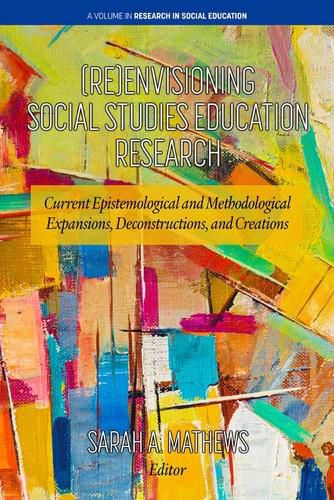Readings Newsletter
Become a Readings Member to make your shopping experience even easier.
Sign in or sign up for free!
You’re not far away from qualifying for FREE standard shipping within Australia
You’ve qualified for FREE standard shipping within Australia
The cart is loading…






This title is printed to order. This book may have been self-published. If so, we cannot guarantee the quality of the content. In the main most books will have gone through the editing process however some may not. We therefore suggest that you be aware of this before ordering this book. If in doubt check either the author or publisher’s details as we are unable to accept any returns unless they are faulty. Please contact us if you have any questions.
This edited book is a continuation of Keith Barton's Research Methods in Social Studies Education (2006), one of the most popular texts in the Information Age's Research in Social Education series. (Re)Envisioning Social Studies Education Research: Current Epistemological and Methodological Expansions, Deconstructions, and Creations explores research in social studies education over the 15 years since. Chapters offer insight into how researchers use different epistemological frameworks and non-traditional or emergent methods to advance social studies scholarship. The book is organized into two sections: (1) methodology as epistemological stretches, revisions, and/or entanglements; and (2) emergent and non-traditional methods in social studies research and practice. Authors pull on diverse and emerging theoretical frameworks, review recently published research, and highlight their own experiences with inquiry in the field. This text serves as a platform to explore the processes and products of diverse research decisions to engage the field in broader conversations that can rethink, expand, and disrupt social studies education research. The intention is also to honor and center epistemological frameworks that have been marginalized in previous scholarship. This text can serve as an entry point for graduate students and novice scholars, while also helping seasoned researchers seek opportunities to expand their own work or mentor students.
$9.00 standard shipping within Australia
FREE standard shipping within Australia for orders over $100.00
Express & International shipping calculated at checkout
This title is printed to order. This book may have been self-published. If so, we cannot guarantee the quality of the content. In the main most books will have gone through the editing process however some may not. We therefore suggest that you be aware of this before ordering this book. If in doubt check either the author or publisher’s details as we are unable to accept any returns unless they are faulty. Please contact us if you have any questions.
This edited book is a continuation of Keith Barton's Research Methods in Social Studies Education (2006), one of the most popular texts in the Information Age's Research in Social Education series. (Re)Envisioning Social Studies Education Research: Current Epistemological and Methodological Expansions, Deconstructions, and Creations explores research in social studies education over the 15 years since. Chapters offer insight into how researchers use different epistemological frameworks and non-traditional or emergent methods to advance social studies scholarship. The book is organized into two sections: (1) methodology as epistemological stretches, revisions, and/or entanglements; and (2) emergent and non-traditional methods in social studies research and practice. Authors pull on diverse and emerging theoretical frameworks, review recently published research, and highlight their own experiences with inquiry in the field. This text serves as a platform to explore the processes and products of diverse research decisions to engage the field in broader conversations that can rethink, expand, and disrupt social studies education research. The intention is also to honor and center epistemological frameworks that have been marginalized in previous scholarship. This text can serve as an entry point for graduate students and novice scholars, while also helping seasoned researchers seek opportunities to expand their own work or mentor students.